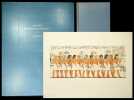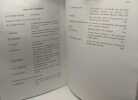584 books for « davies d w »Edit
-
Type
Artists book (1)
Book (596)
Music sheets (10)
New book (2)
-
Latest
Last month (43)
Last week (1)
-
Language
English (10)
French (599)
-
Century
18th (5)
19th (8)
20th (337)
21st (67)
-
Countries
Belgium (49)
Canada (6)
Côte d'Ivoire (1)
Denmark (10)
France (475)
Switzerland (65)
United Kingdom (3)
-
Syndicate
ALAC (2)
CLAM (4)
CLAQ (2)
ILAB (273)
NVVA (8)
SLACES (8)
SLAM (233)
SNCAO (1)
Topics
- Archaeology (19)
- Architecture (5)
- Armourial bearings (2)
- Art deco (2)
- Asia - orient (2)
- Astronomy (3)
- Astrophysics (2)
- Atlas (9)
- Aviation (4)
- Barcelona (3)
- Bibliography (2)
- Biography (5)
- Brittany (9)
- Children’s books (15)
- Collections (2)
- Contemporary look (3)
- Cosmology (2)
- Dedication (2)
- Detective novels (3)
- Drawings (4)
- Economics (2)
- Economics (4)
- Egypt (12)
- Egyptology (6)
- England (11)
- English (9)
- English literature (2)
- Entomology (5)
- Epigraphy (2)
- Ethics (2)
- Exhibition (2)
- Fashion (2)
- Fin de siècle (5)
- Fine arts (11)
- First edition (2)
- Flemish (6)
- Gastronomy (3)
- Geography (2)
- Gill (6)
- Greece (8)
- Guide books (4)
- Guittoneau ben (6)
- Healthcare (2)
- History (37)
- Hunting (3)
- Literature (29)
- London (4)
- Maps (3)
- Maria theresa (3)
- Marriage (3)
- Medicine (2)
- Miller (2)
- Music (4)
- Near-east (3)
- Nobiliary heraldry (4)
- North america (2)
- Painters (3)
- Painting (10)
- Painting (15)
- Philology (2)
- Philosophy (6)
- Photography (9)
- Physics (4)
- Poland (2)
- Policy (2)
- Quebec (2)
- Religions (5)
- Reptiles (3)
- Rock (3)
- Rock (3)
- Science fiction (6)
- Sciences (4)
- Sciences & technique (3)
- Scores (9)
- Simone (3)
- Songs (8)
- Sue eugène (2)
- Tea (11)
- Technology (4)
- Theatre (4)
- Theology (4)
- Translation (3)
- United kingdom (10)
- Universe (2)
- Ussr (7)
- Various (12)
- War (3)
- Williams tennessee (2)
The Case of Labourers in Husbandry Stated and Considered, in Three Parts. Part I. a View of Their Distressed Condition. Part II. the Principal Causes of Their Growing Distress and Number, and the consequent increase of the poor-rate. Part III. Means o... - [FIRST CONSUMER BEHAVIOR ANALYSIS]
Bath, R. Cruttwell, 1795. Large 4to. Contemporary boards, beautifully re-backed in contemporary style, with five raised bands, gilt lines, and gilt red leather title-label to spine. A few light marginal pencil-annotations, small library stamp to lower part of title page, otherwise a very fine copy. 8, 200 pp. + the errata slip inserted after the title-page.
First edition of this landmark work in scientific social inquiry, constituting one of the earliest microeconomic- and consumer behavior- analyses. Davies profoundly influenced social history and initiated the entire field of consumer behavior analysis, two areas of study which were to dominate 19th century economics, relevant not only to economic and social history, but also to present day economic analysis. Davies's work anticipates Eden's ""The State of The Poor"" (PMM 249) by two years. In the present work, Davies discusses in detail the causes of the poverty of agricultural labourers in England, linking the high prices of goods with poverty, and proposes measures to relieve the labourers, including linking their daily wage to the price of bread. Davies's observations demonstrated the failings of the contemporary Poor Laws and was by many seen as a direct criticism of the central policy making (or lack thereof). ""The differences in consumption of poor and rich families excited attention and often compassion, but apparently never quantitative analysis, for many centuries. Finally in England in the 1790's two very different investigators made extensive compilations of workingmen's budgets. [Davies in 1795, Eden in 1797]. Both were stimulated to this task by the distress of the working classes at this time."" (Stigler, The Early History of Empirical Studies of Consumer Behavior). In ""Was bread Giffen? The demand for food in England circa 1790"" (in Review of Economics and Statistics, 1977, Vol. 59, issue 2, pp. 225-29), Koenker developed a problem in statistical demand analysis using samples from the budgets recorded in these works. ""Two seminal budget studies by .. .Davies ... and ... Eden are employed ... to investigate the place of bread in the diets of English rural laborers at the end of the eighteenth century. Because of the considerable geographical and temporal dispersion in prices of foodstuffs found in these budgets, they afford a unique opportunity to study the influences of both prices and income on individual household consumption decisions. In particular a test is made of the famous hypothesis, attributed by Marshall to Robert Giffen, that a rise in the price of bread, ceteris paribus, increases its consumption among the lower classes."" The budget studies to which Koenker refers comprise the 70-page appendix. Davies began collecting statistical data on the poor in 1787 while a rector in the parish of Barkham, Berkshire. ""He collected six detailed budgets of 'typical' agricultural laborers living in Barkham and circulated these budgets widely to friends throughout the kingdom. Some of these correspondents were persuaded to produce similar budgets for their own localities. In 1795 Davies edited 127 of these budgets, wrote a dispassionate plea for a minimum wage law tied to the price of wheat, and published both as The Case of Labourers in husbandry."" (Koenker). In making the case for government intervention, Davies attacks rampant ignorance and prejudice toward the poor, in particular the notion that the poor are profligate creatures of habit. ""It is wonderful how readily even men of sense give in to this censure."" (p. 31).Davies's studies ""were the first examples of studies in that long and semi-honorable liberal tradition of econometrically snooping into the private lives of the poor. By the mid 19th century such studies were being conducted all over Europe by such notables as Ernst Engel, Frederick Engels, Frederick LePlay and others."" (Koenker, Applied Econometrics)David Davies (1742-1819), English clergyman and social commentator, was ordained in 1782 and became the rector of Barkham parish, where he remained incumbent until his death. Kress B2916Goldsmith 16422. Not in Einaudi.
The Case of Labourers in Husbandry Stated and Considered, in Three Parts. Part I. a View of Their Distressed Condition. Part II. the Principal Causes of Their Growing Distress and Number, and the consequent increase of the poor-rate. Part III. Means o... - [PRESENTATION-COPY OF THE FIRST CONSUMER BEHAVIOR ANALYSIS]
Bath, R. Cruttwell, 1795. Large8vo. Bound in later half cloth with gilt lettering to spine. Presentation inscription from the auhtor to top of title page: ""From the Author"". Title page and first few leafes with brownspotting, otherwise a fine copy. Lacking the half title. Pp. 3-8, 200 + the errata slip inserted after the title page.
First edition of this landmark work in scientific social inquiry"" constituting one of the earliest microeconomic- and consumer behavior analyses. Davies profoundly influenced social history and initiated the entire field of consumer behavior analysis, two areas of study which were to dominate 19th century economics, relevant not only to economic and social history, but also to present day economic analysis. Davies's work anticipates Eden's ""The State of The Poor"" (PMM 249) by two years. In the present work, Davies discusses in detail the causes of the poverty of agricultural labourers in England, linking the high prices of goods with poverty, and proposes measures to relieve the labourers, including linking their daily wage to the price of bread. Davies's observations demonstrated the failings of the contemporary Poor Laws and was by many seen as a direct criticism of the central policy making (or lack thereof). ""The differences in consumption of poor and rich families excited attention and often compassion, but apparently never quantitative analysis, for many centuries. Finally in England in the 1790's two very different investigators made extensive compilations of workingmen's budgets. [Davies in 1795, Eden in 1797]. Both were stimulated to this task by the distress of the working classes at this time."" (Stigler, The Early History of Empirical Studies of Consumer Behavior). ""Was bread Giffen? The demand for food in England circa 1790"" (in Review of Economics and Statistics, 1977, Vol. 59, issue 2, pp. 225-29). Koenker developed a problem in statistical demand analysis using samples from the budgets recorded in these works. ""Two seminal budget studies by .. .Davies ... and ... Eden are employed ... to investigate the place of bread in the diets of English rural laborers at the end of the eighteenth century. Because of the considerable geographical and temporal dispersion in prices of foodstuffs found in these budgets, they afford a unique opportunity to study the influences of both prices and income on individual household consumption decisions. In particular a test is made of the famous hypothesis, attributed by Marshall to Robert Giffen, that a rise in the price of bread, ceteris paribus, increases its consumption among the lower classes."" The budget studies to which Koenker refers comprise the 70-page appendix. Davies began collecting statistical data on the poor in 1787 while a rector in the parish of Barkham, Berkshire. ""He collected six detailed budgets of 'typical' agricultural laborers living in Barkham and circulated these budgets widely to friends throughout the kingdom. Some of these correspondents were persuaded to produce similar budgets for their own localities. In 1795 Davies edited 127 of these budgets, wrote a dispassionate plea for a minimum wage law tied to the price of wheat, and published both as The Case of Labourers in husbandry."" (Koenker). In making the case for government intervention Davies attacks rampant ignorance and prejudice toward the poor, in particular the notion that the poor are profligate creatures of habit. ""It is wonderful how readily even men of sense give in to this censure."" (p. 31).Davies's studies ""were the first examples of studies in that long and semi-honorable liberal tradition of econometrically snooping into the private lives of the poor. By the mid 19th century such studies were being conducted all over Europe by such notables as Ernst Engel, Frederick Engels, Frederick LePlay and others."" (Koenker, Applied Econometrics)David Davies (1742-1819), English clergyman and social commentator, was ordained in 1782 and became the rector of Barkham parish, where he remained incumbent until his death. Kress B2916Goldsmith 16422. Not in Einaudi.
Hack Attack. How the truth caught up with Rupert Murdoch.
London, Chatto & Windus, 2014, gr. in-8°, 448 pp, 30 photos sur 16 pl. hors texte, index, reliure éditeur, jaquette illustrée, bon état. Edition originale. Texte en anglais
Le scandale des écoutes de « News of the World » en Angleterre, soit le piratage téléphonique systématique mené par le journal qui appartenait à l’empire de Rupert Murdoch. L'auteur a passé six ans à enquêter sur Murdoch’s News Corp. et sa filiale News International. Son livre dévoile comment la société avait pris l’habitude d’écouter illégalement les messages laissés sur les répondeurs des personnages politiques, des célébrités et même des individus lambda britanniques. Le scandale, qui a éclaté en 2010, a abouti à l'interdiction en 2011 de « News of the World » (après 168 années de publication) et a obligé le gouvernement de David Cameron à réclamer une enquête qui a révélé au monde ces pratiques scandaleuses. Neil Wallis rédacteur exécutif et Rebekah Books, la directrice du journal ainsi que dix autres personnes ont été arrêtés. — « Tous les éléments sont réunis, le mensonge, la corruption, le chantage, dans les plus hautes sphères du gouvernement, par le plus grand journal de Londres. » (George Clooney) — "This is the book we've been waiting for, the thrilling and important inside story of how a single reporter came through with the truth of the hacking scandals. He exposed shameful intrusions, the years of deceit, lies, and bullying. And he did more. He revealed a rottenness at the heart of British life in the relations of press, police, and Parliament, institutions that, taken as a whole, failed the big test. Hack Attack is an indictment of the worst of journalism, but is itself an exhilarating demonstration of how the best of journalism-hard-won, honest reporting-is the lifeblood of any democracy." (Sir Harold Evans) — "First in the Guardian and now in this book, the reporting of Nick Davies has revealed the insidious abuse of power-and the public trust-by the Murdoch press from the top down. The British hacking scandal is the ultimate expression of Murdoch-culture run amok: corruption in the Fourth Estate as dangerous to democracy as the worst excesses of heads of state. " (Carl Bernstein) — "Nick Davies is Britain's greatest investigative journalist... This book is as exciting as a thriller but far more important... should be compulsory reading in journalism schools and must be read by anyone who wishes to understand how British politics actually works." (Peter Oborne, Telegraph) — "Gripping .the best account we have of the phone-hacking scandal and the attendant police corruption and cover-ups...A masterly summary of the hacking affair, as well as the ingenuity and persistence that lead to great journalism." (Henry Porter, Observer) — "What is revealed here, in painful, careful detail, is a journalism that held power in contempt. Nick Davies has done a colossal service to Britain's democracy. Hack Attack is the book of a very bold reporter about a passage of arms that he won, to our great benefit." (John Lloyd, Financial Times) — "Davies' account of how Murdoch and his dysfunctional lieutenants ensnared, enslaved, and frightened generations of politicians is blistering." (Will Gore, Independent on Sunday)
The Thought of Thomas Aquinas
Clarendon press 1993 in8. 1993. Broché.
Très Bon Etat de conservation intérieur propre bonne tenue
Gods Playground. A History Of Poland In Two Volumes VOLUME I: The Origins to 1795 + VOLUME II: 1795 To The Present
Clarendon Press / Oxford 1982 in8. 1982. Broché. 2 volume(s).
Bon état couverture un peu défraîchies intérieurs propres bonne tenue
Je t'ai attendue toute ma vie + L'envoyée du destin --- 4 volumes Harlequin série chance
Harlequin 1987 in12. 1987. Broché. 2 volume(s).
bon état de conservation
Mission à Moscou - traduit par Albert Pascal
L'arbre 1944 in8. 1944. Cartonné.
bon état de conservation couverture un peu défraîchie intérieur propre tranche ternie en tête
Ancient Egyptian Painting.
3 Bände. Chicago, University of Chicago Press, 1936. Gross-Folio, 4° (Textband). XLVIII S., 209 S. (Kommentarband). Mit 100 farbige Illustrationen in Chromolithografie. Leinenbände mit Deckelillustrationen. Bildbände in Kartonschuber.
Erstausgabe, bearbeitet von H. Gardiner. Sonderausgabe von «The Oriental Institute of The University of Chicago». – In sehr gutem Zustand.

Phone number : 41 (0)44 261 57 50
The Story of Wales [Britain in Pictures series 62]
Collins / London 1947 in8. 1947. Broché.
bords frottés jaquette défraîchie intérieur propre
Le Mariage Au Temps de la Renaissance
Klincksieck 1994 294 pages 15x1 8x20 8cm. 1994. Broché. 294 pages.
très bon état de consevation intérieur propre
Le Big Crunch Les trois Dernières Minutes de l'Univers
Hachette 1998 187 pages in8. 1998. Broché. 187 pages.
proche du neuf
The Last Three Minutes: Latest Thinking About the Ultimate Fate of the Universe
Weidenfeld & Nicolson 1994 176 pages in8. 1994. Cartonné jaquette. 176 pages.
Bon état jaquette légèrement défraîchie intérieur très porpre très bonne tenue
La vie quotidienne des premiers chrétiens
Delachaux et Niestlé 1956 in8. 1956. Broché.
Bon état couverture défraîchie bords frottés intérieur propre qques rousseurs sur tranche de tête
Sermadiras Patrick Artur Evelyne Botter Véronique Davies Caroline
Reference : 100099230
(1989)
Annuaire de l'Art international - International guide 12e édition
Sermadiras 1989 in8. 1989. Cartonné.
bon état cependant coins émoussés intérieur propre tranche un peu ternie annotation sur la première garde et le faux titre
Egyptian Hieroglyphs
British Museum Press 2005 64 pages 17x24x1cm. 2005. Broché. 64 pages. iconographie en noir et blanc
Bon état intérieur propre
The pursuit of Music
Thomas Nelson & Sons LTD in8. Sans date. Cartonné.
Bon état couverture ternie intérieur propre rousseurs dans les plats intérieurs
James Watt and Steam Power.
London, Jackdaw Publications, 1967. Quer-4°. (4) S. Mit Abb. nach alten Vorlagen auf 15 Faltbogen. Lose Bogen in bedruckter Pappmappe (mit Gebrauchsspuren). = "Jackdaw", No. 13.
Au faucon bleu
Famot 1976 collection les grands maîtres du roman policier. in12. 1976. Cartonné.
Bon Etat de conservation intérieur frais
Nature's Numbers: The Unreal Reality Of Mathematics + The origin of the universe + The Periodic kingdom + The last three minutes --- 4 volumes
Basic Books 1995 176 pages 13x23x2cm. 1995. Relié. 4 volume(s). 176 pages. Nature's Numbers: The Unreal Reality Of Mathematics + The origin of the universe + The Periodic kingdom + The last three minutes --- 4 volumes
Très bon état avec jaquette intérieur frais
Je fais des tableaux premiers essais 3 + Je fais des impressions premiers essais 4
Fleurus 1972 in8. 1972. Agrafé. 2 volume(s).
Bon Etat
Le guide des plaisirs de londres
Laffont 1967 426 pages 20x11. 1967. Broché. 426 pages.
tranche tachée. intérieur frais
Au faucon bleu
Famot 1973 in12. 1973. Cartonnage editeur.
Très Bon Etat étiquette collée à l'intérieur de la première de couverture
Thailande
Berlitz Publishing 1996 144 pages in16. 1996. Broché. 144 pages.
Très Bon Etat micro rayures
 Write to the booksellers
Write to the booksellers













![The Story of Wales [Britain in Pictures series 62]. Rhys Davies](https://static.livre-rare-book.com/pictures/ATM/100123235_thumb.jpg)
![The Story of Wales [Britain in Pictures series 62]. Rhys Davies](https://static.livre-rare-book.com/pictures/ATM/100123235_1_thumb.jpg)
![The Story of Wales [Britain in Pictures series 62]. Rhys Davies](https://static.livre-rare-book.com/pictures/ATM/100123235_2_thumb.jpg)



























